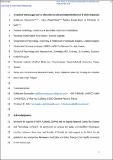Files in this item
A machine learning approach to infant distress calls and maternal behaviour of wild chimpanzees
Item metadata
| dc.contributor.author | Dezacache, Guillaume | |
| dc.contributor.author | Zuberbühler, Klaus | |
| dc.contributor.author | Davila-Ross, Marina | |
| dc.contributor.author | Dahl, Christoph D. | |
| dc.date.accessioned | 2021-10-21T23:38:48Z | |
| dc.date.available | 2021-10-21T23:38:48Z | |
| dc.date.issued | 2020-10-22 | |
| dc.identifier | 270823016 | |
| dc.identifier | 28185f77-45fd-49ad-8b84-50465d697de8 | |
| dc.identifier | 85093846239 | |
| dc.identifier | 000581560500002 | |
| dc.identifier.citation | Dezacache , G , Zuberbühler , K , Davila-Ross , M & Dahl , C D 2020 , ' A machine learning approach to infant distress calls and maternal behaviour of wild chimpanzees ' , Animal Cognition , vol. First Online . https://doi.org/10.1007/s10071-020-01437-5 | en |
| dc.identifier.issn | 1435-9448 | |
| dc.identifier.other | ORCID: /0000-0001-8378-088X/work/82788549 | |
| dc.identifier.uri | https://hdl.handle.net/10023/24181 | |
| dc.description | We are grateful to the Royal Zoological Society of Scotland for providing core funding to the Budongo Conservation Field Station. This research was supported by funding from the European Union’s Seventh Framework Programme for research, technological development and demonstration (Grant agreement no 283871), a Fyssen Foundation post-doctoral fellowship awarded to GD, the Swiss National Science Foundation (PZ00P3_154741) and Start up-funding of the Taipei Medical University (108-6402-004-112) awarded to CDD. | en |
| dc.description.abstract | Distress calls are an acoustically variable group of vocalizations ubiquitous in mammals and other animals. Their presumed function is to recruit help, but there has been much debate on whether the nature of the disturbance can be inferred from the acoustics of distress calls. We used machine learning to analyse episodes of distress calls of wild infant chimpanzees. We extracted exemplars from those distress call episodes and examined them in relation to the external event triggering them and the distance to the mother. In further steps, we tested whether the acoustic variants were associated with particular maternal responses. Our results suggest that, although infant chimpanzee distress calls are highly graded, they can convey information about discrete problems experienced by the infant and about distance to the mother, which in turn may help guide maternal parenting decisions. The extent to which mothers rely on acoustic cues alone (versus integrate other contextual-visual information) to decide upon intervening should be the focus of future research. | |
| dc.format.extent | 2726478 | |
| dc.language.iso | eng | |
| dc.relation.ispartof | Animal Cognition | en |
| dc.subject | Crying | en |
| dc.subject | Whimpers | en |
| dc.subject | Pan troglodytes | en |
| dc.subject | Support vector machine | en |
| dc.subject | Machine learning | en |
| dc.subject | BF Psychology | en |
| dc.subject | DAS | en |
| dc.subject.lcc | BF | en |
| dc.title | A machine learning approach to infant distress calls and maternal behaviour of wild chimpanzees | en |
| dc.type | Journal article | en |
| dc.contributor.institution | University of St Andrews. Institute of Behavioural and Neural Sciences | en |
| dc.contributor.institution | University of St Andrews. Centre for Social Learning & Cognitive Evolution | en |
| dc.contributor.institution | University of St Andrews. School of Psychology and Neuroscience | en |
| dc.identifier.doi | 10.1007/s10071-020-01437-5 | |
| dc.description.status | Peer reviewed | en |
| dc.date.embargoedUntil | 2021-10-22 |
This item appears in the following Collection(s)
Items in the St Andrews Research Repository are protected by copyright, with all rights reserved, unless otherwise indicated.

